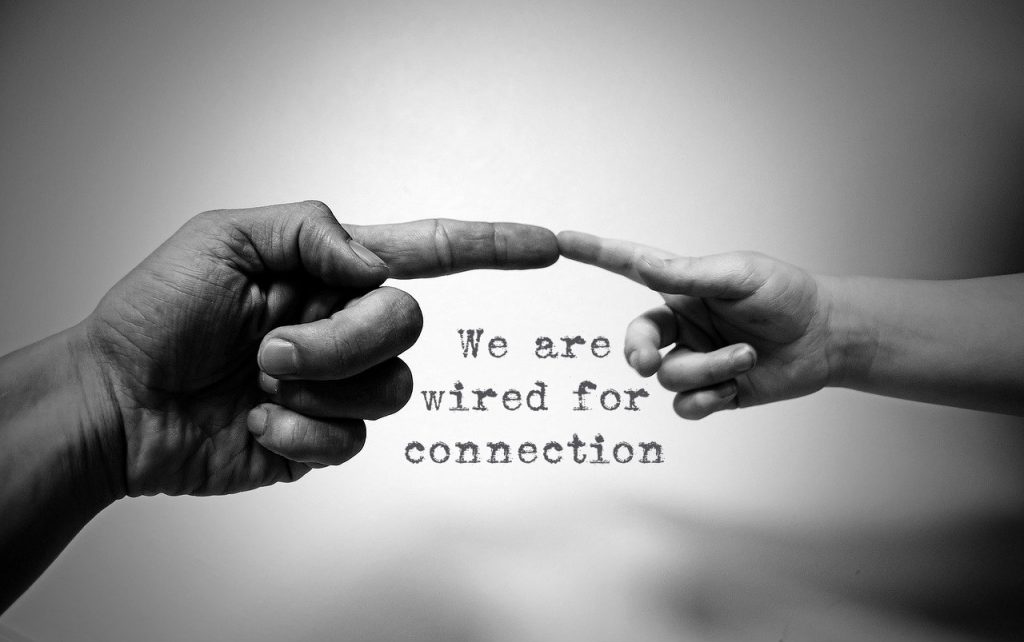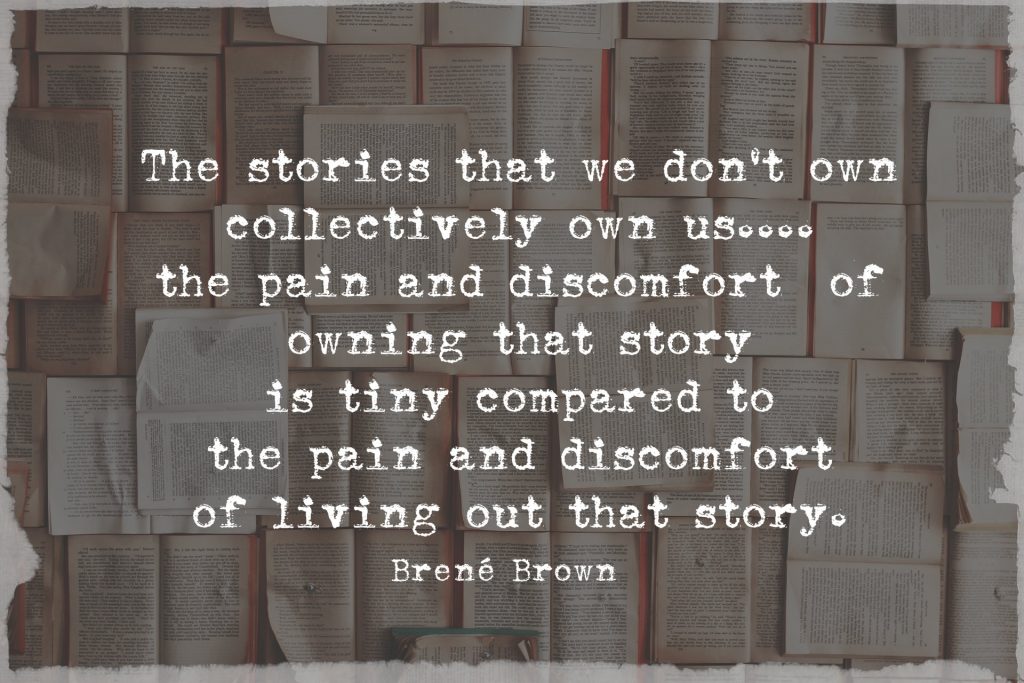I’ve been a regular guest on 680CJOB for several years.
Every Thursday at 2:30 finds me in the chair opposite Greg Mackling and Brett Megarry. We talk about issues related to mental health and relationships. Almost every week, I get a chance to say the truest sentence I know: “We are wired for connection” as we discuss the topic du jour.

I hope the conversations we have are enlightening, and helpful. I seek to inspire people to greater relationships and mental health. I show up in the hope that a listener will be inspired to dialogue with themselves and their family, perhaps develop a new insight in the listener.
My topics are generally not controversial. Who would argue against mental health?
Radio is an arena where I practice vulnerability and courage. I’ve learned lots about courage doing weekly radio. I learned I can do hard things. Where I seek to be authentic to my values. Where I want to live in alignment with my inner best self. And radio is live. I can’t predict the conversation, even though we plan together the topic ahead of time.
I unknowingly stepped into controversy the day I said, “White privilege” on air. Earlier in the afternoon, Brett Megarry had been telling the story of how he entered a store to do some shopping that morning. He was outraged and uncomfortable that on departing the store, they demanded to search his backpack. He knew he didn’t steal anything. He didn’t like that they were treating him suspiciously when he had done nothing wrong.
I named his anger as something that was born of white male privilege. There are segments of society that understand that they are treated suspiciously all the time, even though they know themselves to be honest. Brett wasn’t used to suspicion. People texted and emailed in outrage, in ways that never happens during my segment.
Several weeks later, during a commercial break, we were chatting about the flurry of indignant responses that had arisen out of my naming of “white privilege” to Brett’s experience. The indigenous man in the room, responded casually and automatically, chuckling, “I wouldn’t even think about entering a store with a backpack.”
That conversation has had me looking in the mirror as us Canadians shake our head at what happened in Charlottesville, as we look at the recent rise of overt racism in the United States.
While we grieve what is happening in the US, we feel disconnected from it. The resurgence of Nazi greetings in America is revolting…but feels far removed from our reality in Canada. But that conversation in the radio studio reminded me that maybe it’s not that far removed.
I posted a Facebook live video that Brené Brown did on my Conexus Counselling Facebook page. I’ve listened to it a few times. Maybe you’ll want to listen too?
She begins:
I talk a lot in my work about the power of owning our stories. I talk about if we own our story we get to write the ending, and if we don’t own our story the story owns us. ..in own my own story [about attempting to outrun vulnerability and perfectionism] and being truthful about it for the first time, it changed my life.
Up to that point, I had tried to orphan that part of my life, you know, and tried to pretend that I wasn’t afraid, that I had my sh*t together all the time. Owning that story gave me the right to pick up that pen and write the ending.
If we think about collectively, if we know it’s true in our own lives the things we own we get to write the ending and the stories we don’t own own us, we can take that micro lesson and apply it in a macro, in a community concept.
The stories that we don’t own collectively own us.
We have to own the story in order to write the ending. And I know it’s painful, but it’s not as painful as spending our lives running from our story. And our collective story in the United States is a story of white supremacy. That is the story. That’s our story. And we have not owned it. So now it owns us. It still owns us. And it defines us.
We have not had the courage to step in and own the story and say, “This is the truth about where we come from and what we’ve done.” I think what’s really powerful for me personally is understanding that the pain and discomfort of owning that story is tiny compared to the pain and discomfort of living out that story.
Brené Brown
I listened to that and thought about it. And was challenged to apply it to myself. I have never heard that Canadians have a history of white supremacy. I’m not familiar with “white supremacy” as a term we use in Canada to describe our history.

But our history of residential schools said: “Our language is better than yours. Speak it. Our culture is better than yours. Live it. Our education is better than yours. Learn it. We want you to assimilate to become like settlers–like us.” Wouldn’t that be a clear example of white supremacy? That our European/settler culture has considered itself supreme to indigenous culture, and then lived out that belief in a manner that attempted cultural genocide?
I was born in Canada. My people fled with nothing two generations ago from Stalinist Russia. They escaped persecution, starvation, imprisonment and death. My predecessors had no part of the residential school system–they weren’t around to be a part of starting it, and they were too busy trying to survive in a new country to have influence over it.
However, I live in a system that is stepped in the effects of it. And as a settler, I am a person that benefits from colonization.
Ironically, one of the ways a person can know they have white privilege is that they are generally not aware of privilege. I am rarely in a situation where I am uncomfortable about race. Why would I be? Because I am in the dominant, privileged race.
When race is irrelevant for you–then you benefit from privilege.
It’s a critical and important piece of restoration and reconciliation in our country for settlers to recognize that white people continue to have an advantage because of our history. It’s not that life is automatically easier for all white people all the time, but that we have perks that aren’t available to ethnic minorities. Privilege, quickly defined, is when “we get that which we have not earned.”
Peggy McIntosh writes: “White Privilege: Unpacking the Invisible Knapsack” to open eyes about the important but difficult-to-see privilege. She writes about examples of privilege (from an American perspective, to be sure–but thoughtfully consider them in our Canadian context):
I can arrange to be in the company of people of my race most of the time.
I can be pretty sure that my neighbors will be neutral or pleasant towards me.
I can go shopping alone most of the time, pretty well assured that I will not be followed or harassed.
When I am told about our national heritage or about “civilization,” I am shown that people of my color made it what it is.
Whether I use checks, credit cards, or cash, I can count on my whiteness not to work against the appearance of my financial reliability.
I can swear, or dress in second hand clothes, or not answer letters, without having people attribute these choices to the bad morals, the poverty, or the illiteracy of my race.
I can do well in a challenging situation without being called a credit to my race.
I can be pretty sure that if I ask to talk to the “person in charge,” I will be facing a person of my race.
So, I’ve been spending the last few days thinking about the loud and frightening actions of Americans. We Canadians have been feeling both compassion and outrage. Today, the U.S. steels itself for more protests and counterprotests that center around rights and race, as Jews and African Americans and Muslims fear for their safety in a country that has increasingly vocal voices that incite danger and violence and suppression of basic human rights.
What I’ve been thinking about it this: what lessons can we as Canadians draw from?
What shades of the current American ugliness are found in the way we live here? What uniquely Canadian uglinesses do I avoid identifying?
In what ways have I denied the story in ways that have that story own me and the way I live? What part of the story do I have to own, so that I can participate in writing the ending?
In what ways do I say, “We are wired for connection,” but benefit from privilege that actually disconnects me from so many in other cultures, including the one that was here first? How am I blind to my own life in ways that cut the wires of connection for those around me?
I’m not sure I have a whole lot of answers, but I am committed to asking the questions.
Let’s all talk about this, with a diversity of voices? Let’s allow for brave conversations that will feel tender and therefore frightening, but worthwhile? Let’s say upfront that in these conversations, stuff is bound to come out wrong, but at least it will have a chance to get feedback and become more informed.
These conversations are uncomfortable. The temptation is to minimize these issues–in ways that deny the story, because it’s really hard to acknowledge the ugliness. As Brené Brown says, the temptation to avoid these conversations is powerful, but to avoid them does us an even greater impoverishment.
Let’s continue to explore, and grow, and connect and learn the way so very many have already been doing.






Write a Comment